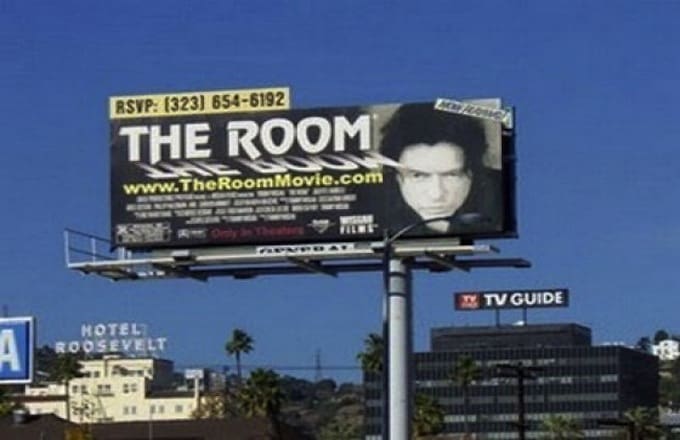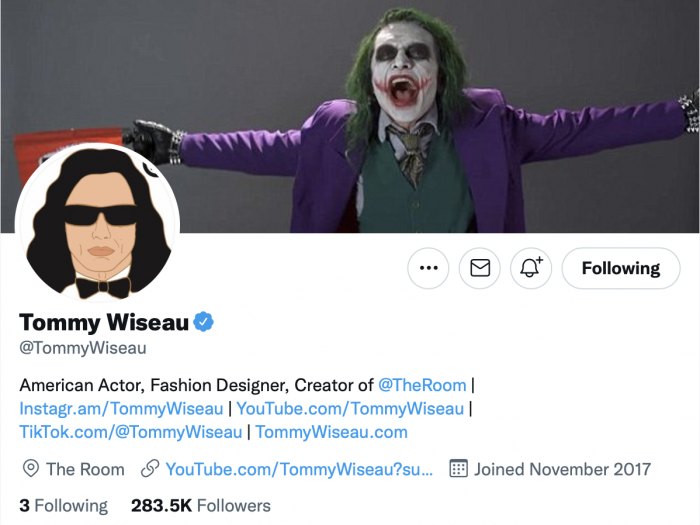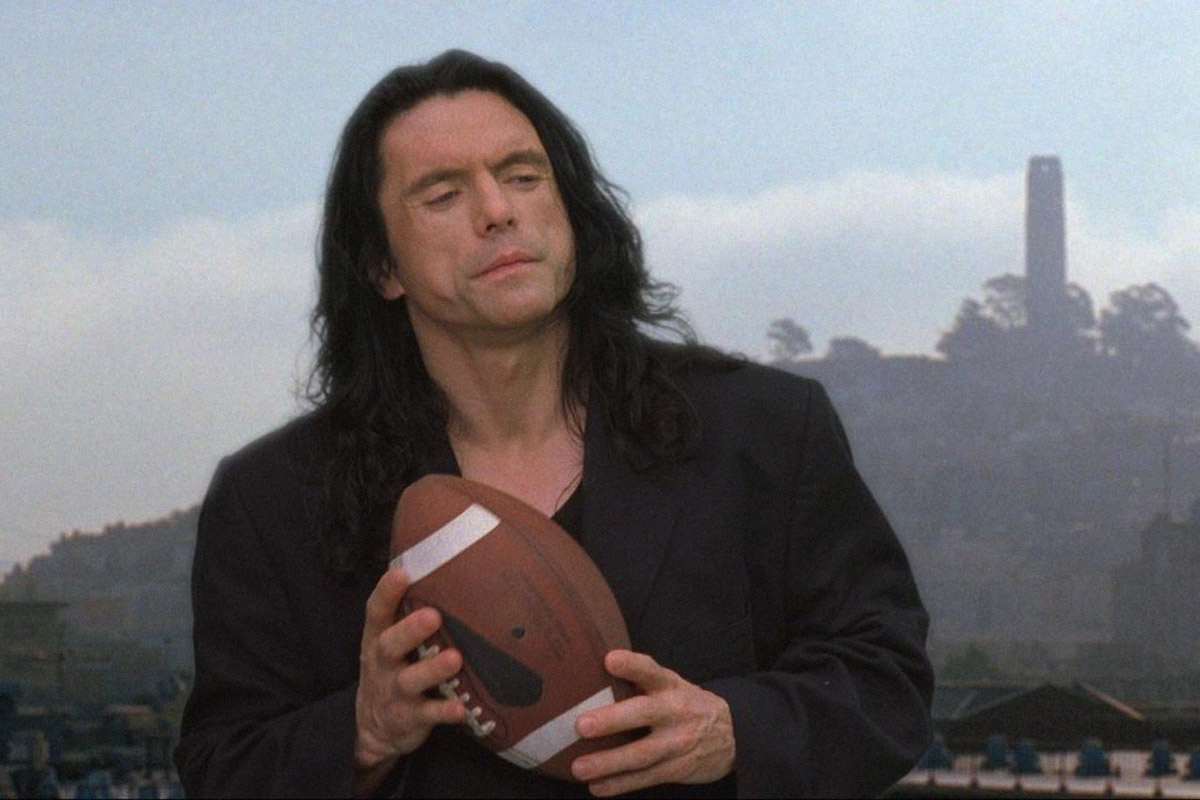I was in V Bar when the call came. My phone flashed with an American number and I knew who it must be. It was Tommy Wiseau.
Tommy Wiseau is a character, both in his films and in real life. A writer, director, and actor, he’s known for his signature style and the often bizarre substance of his work. It all started with his 2003 flop-turned-fortune cult classic, The Room. Debuting to a panning by critics and little love in California, in the years since it has built up an exceptional following, catapulting its successor to his very own brand of Hollywood stardom.
The Room follows the strife and sex-life of lead protagonist, Johnny, played by Wiseau, as he navigates a love triangle with fiancée Lisa and best friend Mark. There’s drama, there’s betrayal, there are all the makings of what critics and fans have called “the best worst movie ever”.
Screenings of The Room have developed a language all of their own; whether it’s shouting along to Johnny’s “You’re tearing me apart Lisa!” or hurling spoons at the screen whenever their iconic imagery appears. Veterans of the experience have put together guides to ensure newcomers can truly appreciate the experience.
It’s taken the years since its premiere in 2003 for these rituals to develop and for the film to move from two theatres in California to a worldwide audience. Now Johnny and his pitch-perfect phraseology is finally coming to York with a screening at York Student Cinema. All eyes on campus are set to turn to Tommy’s hypnotic rhythms.

Off screen, Wiseau’s presence is just as commanding and puzzling. His past is a closed book for even the most devout fan or his own personal friends. It’s this combination that make him all the more interesting to talk to. I spent 45 minutes on the line to Tommy, a continent apart but only a room away. Here’s what I found out.
I started by asking about the enduring success of The Room and how it can still connect to new audiences. After all, there are now students on campus who weren’t even born when the film released.
Tommy immediately hits on the idea of escapism as part of the appeal, encouraging those who haven’t seen it before to “have fun and forget the world for one moment”.
Even if they aren’t an immediate fan, he recommends a second viewing: “maybe eventually you like something”. He’s very keen for repeat viewings, confident in the fact that audiences will find something for them.
Tommy follows with a common refrain and message of his work, saying “If a lot of people love each other, the world will be a better place to live”.
For the initial years of The Room’s release, while the lone billboard loomed large over Hollywood, it received criticism from critics and little of the adoration it would later receive. Wiseau’s persistence and belief in his vision is a clear trait of his career and one I wanted to explore further. When asked about this bullishness in the face of early hardship, he told me,
“I always thought that I will create something that people will recognise eventually.”
I soon learned that part of this determination is grounded in experiences of disaster, such as the impact of Hurricane Katrina on New Orleans a year after his film debuted.
“After five or six years I thought, well, we will survive everything. We survived Katrina.”
Tommy described this time as a very creative period for himself.
We went deeper into Tommy’s background and how his time working in construction shaped his future projects. It was at this point that Tommy asked me a question of his own, “Would you be flipping hamburgers or building the building?”
After a moment’s pause, I learned that Tommy agreed with me that he’d also rather be building a building. We moved swiftly on to his influences, a discussion which led Wiseau to declare: “I Influence myself.” It’s a sweeping statement of self-belief and one of many to come. Tommy points to Orson Welles as a “father figure”, with Citizen Kane serving as inspiration for The Room.
James Dean is soon mentioned alongside Elizabeth Taylor in A Streetcar Named Desire (1951) as performances that “give us something special”. Immediately afterwards Tommy’s trying to sell me his underwear. It’s clear that he sees himself as a creator, whether it’s in film, buildings, or boxer briefs.
“I don’t know if you know, I also designed stuff like the TW [Tommy Wiseau] underwear?”
This is just one part of Tommy’s online brand and the perks of cult stardom. On his website, you can find not just a range of Tommy Wiseau briefs, but also backpacks, watches, and even a toy of a talking dog. More broadly online, Tommy has found himself on Jimmy Kimmel Live, breaking down film scenes for Vanity Fair, and reading lines from The Dark Knight on Nerdist. It’s a beat that ticks alongside someone who has clearly grown to enjoy the spotlight.
However, that spotlight has illuminated little on Tommy’s own past. One way fans have sought to greater understand him is through his work with The Room, considered to be semi-autobiographical. I asked Tommy about how his experiences have affected the stories he’s told through film.
“I don’t want to do melodrama to present to people, I want realism. So what you see with Denny or Chris or Mark… all the characters… Johnny… are from real life or changed the name. Some are 100% real.”
As a very private individual, giving the audience a view into his life is one that’s undoubtedly opened him up, both to praise and criticism.
“As you know the press has been very kind in the last three or four years but in the beginning it was very brutal.”
Tommy seems much more at home with fans rather than film critics, the nature of The Room‘s screenings keeps his fans as much in the spotlight as the actors screen. Audience participation is a notable feature of screenings of The Room and Tommy is full of encouragement. He told me that in the earlier days, he would tell audiences to say whatever they want and keep reassuring them that this is a good way to interact with the picture. Put succinctly by Tommy, “[Y]ou can express yourself.”
However, that does come with limits when getting involved in what has become a shared experience.
“You have to be responsible in certain degrees, but 99% [of the time] everything goes. Whatever you want to do, it’s fine. There’s nothing wrong with that.”
It’s this interactivity that makes showings often feel more like theatre than a film screening. The roots of this interactivity may be traced back to The Room’s original form as a play written for the stage with Tommy saying of The Room:
“I wrote this 600 page book that is basically supposed to be a play.”
That ambition is still there and he made his goal of Broadway clear. It was in this discussion that Tommy revealed that the decision to move from play to screen was at least partially motivated by material concerns, stating:
“The number of people going to the play theatre… [the] UK is different because you have a lot of theatres… in America we don’t have that.
“I concluded that the number of people going to American theatres was so little and then you have limitations because of money.”
It was at this point that Tommy revealed he is writing a memoir, in which he hopes to cover this period in more depth.
“I just want to present the audience with the truth about The Room, because still now after all these years some people don’t grasp [that] this is hard work, it doesn’t happen by accident. They think it’s a fluke or whatever but with due respect, that’s BS.”
Tommy told me that he went through five rough drafts of the script. He promises that the memoir will be “detailing all this rollercoaster ride and then success of The Room worldwide.”
With worldwide recognition, Tommy seems especially proud of his standing among those in Hollywood, telling me that even Clint Eastwood knows about The Room.
“Anybody in Hollywood knows about The Room now.
“I’ve received great support from everyone in Hollywood… extremely great support and very warm and very sincere, not funny, you know, you sometimes have funny support. They say they like this and that but they don’t really mean it.”
It’s this sincerity that Tommy clearly both wants and appreciates. The memoir appears to be just one piece of that: an opportunity to tell a story that so far has been more of a legend. In being very private about his life before stardom, it’s allowed his story to be told by others: whether fans piecing together parts online or his co-star Greg Sestero in his book, The Disaster Artist: My Life Inside The Room, the Greatest Bad Movie Ever Made. This is a chance for Tommy to tell that story, his story, himself.
Since the book’s release in 2013, it was quickly picked up by James Franco and adapted for the screen in his Academy award nominated film The Disaster Artist. I asked Tommy for his thoughts on the film and if he would be writing this memoir if it weren’t for the conversation it started.
“The Disaster Artist did a good job because they took the message to people… and what I liked from The Disaster Artist is [that] they give the message of a friendship, of a sort of betrayal at the same time of success of someone who cannot succeed.”
The universality of these experiences are a recurring topic and one that’s given credit by Tommy for the success of The Room and its broad appeal. He’s quick to make a connection between the US and the UK as countries with shared outlooks and influences.
“We love you guys because I think the UK and America is like, I would say, brother/sister, something like this relationship because if I go to the UK I always have a good time… because you know, the warmness as well as the culture and also influences and interests. For example, bills or overtime or performance actors for example. We have a lot of stuff in common.”
Those shared influences tie into the central themes of The Room, whether it’s friendship, betrayal, or working life in the 21st century. It’s a topic that evidently excites Tommy’s passion for directing.
“We have a great respect for your Queen… I personally do because it’s a part of the culture, you relate to it. You relate to symbolism as well as a better tomorrow and I think that’s important. I think we as a people should maintain that and try to find a better communication and that’s what The Room does. I always say you may laugh, you may cry, you can express yourself… but please don’t hurt each other, you know, and I’m trying to give them my little message even though the world is so big and I’m so tiny.”
This message is one that Tommy repeated not just though our call but also throughout the years since The Room’s release. It’s a universal message of acceptance and self-expression.
Leading on from this, I asked Tommy for his message to those joining the University of York.
“My message is may all your dreams come true, whatever they are. That’s my message and work hard. You know, whatever you do, if you work you study, or you want to continue study. Society in the past five [to] ten years… big change and you have to accept that, you have to be [a] multitasker.
“Being universal, as I call it, and finding your happiness within yourself and I think good spirit will guide you.”
Tommy is most closely associated with The Room; at the start of our interview and in his other media appearances, the focus is overwhelmingly centred on the production and reaction to that single film. However, Tommy has a large body of work outside of The Room.
Whether it’s his 2004 documentary Homeless in America or 2015 sitcom The Neighbours, Tommy has not stopped writing, directing, or acting since his success. However, for many he is still known for that single film that started in a few film theatres in California 18 years ago. It’s this experience of the creative process, starting new projects when you are so closely tied to one of your first, that made me push further. I wanted to know if it felt like a constraint or as a platform for his future forays. Tommy told me,
“Sometimes there is certain conflict because people don’t understand that The Room is one thing and The Neighbours have been part of a different project.”
Since his success with The Room, Tommy told me he has been approached to star in various projects, with him having to be careful to choose those where he can respect the director’s vision.
“Sometimes people expect for me to do certain projects and started and it doesn’t make sense, you know. Unless you hire me as a director or actor or whatever else is there.”
At this point you would be wise to wonder what we can expect next from Tommy. We moved our conversation to discuss his next project, Big Shark. This horror drama marks a departure from his previous work, being set to release later this year and seeing the return of long time collaborators Greg Sestero and Tommy Wiseau to the big screen.
Tommy sums up the film as “about three fire men who rescue New Orleans from the shark”. He went on to confirm a theatrical release for Big Shark and revealed that it will eventually visit London for filming.
In the 18 years between these two films, the ways directors can communicate with their audiences has fundamentally changed. Tommy has over 280,000 followers on Twitter that he can reach and interact with at a moment’s notice and that bond with a director of a cult classic and their fans is all the tighter.

“I go extra miles with audiences because I love them and they love me… apparently.”
“You cannot buy sincerity between the relationship between audience and creator and I believe the sector will tell you the same thing… Leonardo Da Vinci will tell you the same thing, that sincerity you cannot trade. It’s not like comedy, it’s the real world.”
It’s easy to see that Tommy holds this relationship in a state of reverence, with it being a two-way connection between creator and appreciator, director and fan. This brought us onto something which Tommy believes he gave not just his fans but the world: the midnight screening.
It started with Tommy telling me, “I think The Room was [a] pioneer of the midnight screening even though, Will, I’ll be honest with you, we don’t get the recognition for it.”
Back in 2003, Tommy insisted on showing The Room at midnight, despite being told by the theatres that “this is the worst timing… [a] midnight screening”.
“Before then you didn’t have midnight [screenings], you didn’t have horror movies at midnight or even [on] Halloween. Now you have thousands worldwide.
“But you see, nobody can say, ‘hey you know The Room pioneered’.”
Screenings have since become more accessible, with showings available throughout the day as well as the traditional midnight slot. However, Tommy still tells me that audiences still enjoy watching The Room at midnight the most.
Whatever The Room’s influence on the use of midnight screenings, they’ve become increasingly popular in the decades since, with audiences lining up to see No Time To Die at Tommy’s favourite hour when it hit cinemas last month.
Naturally, I asked Tommy if he would be the next Bond only for him to jump at the suggestion, saying “I would love to do it”. Tommy treads a fine line between his own brand of humour and sincerity, even during an interview, following up with, “Maybe you can recommend me and they can contact me because I know the movie very well.”
It’s not only a role he would like but one he believes he could master.
“I think it would be a good one too because eventually I’ll be doing Joker you know, because we made up a script and worked with them.”
Tommy has a history with the character of Joker, having starred in a make-up heavy 2019 short film for The Nerdist, recreating the iconic interrogation scene from The Dark Knight with Greg Sestero. This is an addition to a separate audition tape Tommy has filmed for the role. It’s a clear fascination and one which he believes will lead to future roles.
“I think eventually [it] will come out because I believe in destiny.”
It’s as part of this discussion that Tommy first praises a contemporary, the late Heath Ledger, commenting, “I think Heath Ledger did such an excellent job, [it’s] too bad he’s not around.”
For all the mystique, it’s clear that Tommy views himself and his work as having a deserved seat at the table of Hollywood’s greats. He’s still got energy and a vision for new projects with lofty ambitions for his films, himself, and humanity. An enigma but a very human one. He’s a man with a clear message: if we all love each other, the world will become a better place.
We end with Tommy going back to work on Big Shark and me going back to V Bar for their strongest tap water. It’s a decidedly different night but not one I’d swap for any other.
The Room will be screening at York Student Cinema at 6:45 pm on Friday 12 November in P/X/001.
